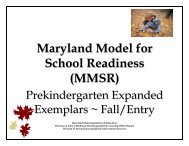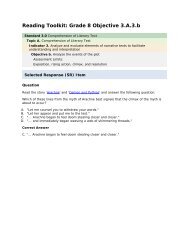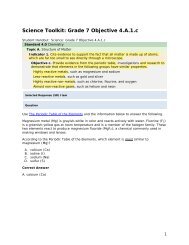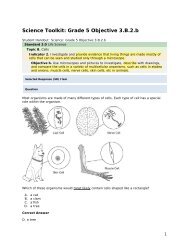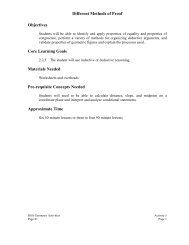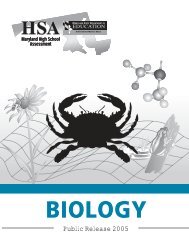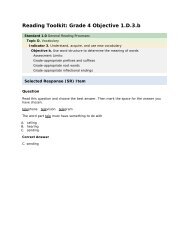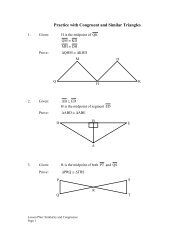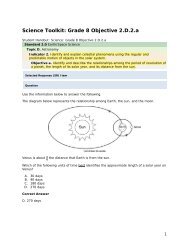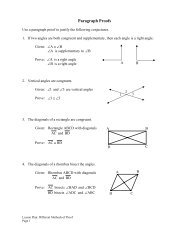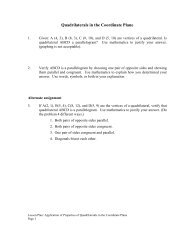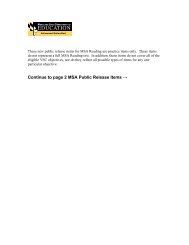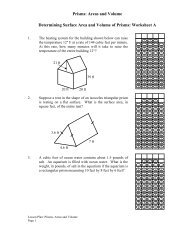Maryland common core state curriculum framework reading ... - mdk12
Maryland common core state curriculum framework reading ... - mdk12
Maryland common core state curriculum framework reading ... - mdk12
Create successful ePaper yourself
Turn your PDF publications into a flip-book with our unique Google optimized e-Paper software.
Reading Standards for Literature (RL)<br />
<strong>Maryland</strong> Common Core State Curriculum<br />
English Language Arts<br />
Cluster: Integration of Knowledge and Ideas<br />
RL9 CCR Anchor Standard Analyze how two or more texts address similar themes or topics in order to build knowledge or to compare the approaches the authors take.<br />
Grade 9-10 students:<br />
Grade 11-12 students:<br />
RL9 Analyze how an author draws on and transforms source material in a specific work (e.g.,<br />
how Shakespeare treats a theme or topic from Ovid or the Bible or how a later author draws<br />
on a play by Shakespeare).<br />
RL9 Demonstrate knowledge of eighteenth-, nineteenth- and early-twentieth-century<br />
foundational works of American literature, including how two or more texts from the same<br />
period treat similar themes or topics.<br />
Essential Skills and Knowledge<br />
Essential Skills and Knowledge<br />
• Demonstrate understanding of why certain literary themes transcend time.<br />
• Analyze and explain themes <strong>common</strong> to specific time periods in American history.<br />
• Analyze specific universal themes of the human condition and how they are<br />
transformed by different authors.<br />
• Analyze and evaluate the impact of historical and/or cultural experiences on literary<br />
themes or topics.<br />
• Participate actively and appropriately in discussions about literature.<br />
• Interpret, explain, and apply appropriate academic and/or domain-specific vocabulary<br />
• Compare and contrast the treatment of similar themes or topics by two or more<br />
authors of the same time period.<br />
when responding and discussing literature. (See 9-10 CCSS L.4 & L.6)<br />
• Participate actively and appropriately in discussions about literature.<br />
• Use knowledge of language and its conventions when speaking and writing. (See 9-10<br />
CCSS L.1)<br />
• Interpret, explain, and apply appropriate academic and/or domain-specific<br />
vocabulary when responding and discussing literature. (See 11-12 CCSS L.4 & L.6)<br />
• Use knowledge of language and its conventions when speaking and writing. (See<br />
11-12 CCSS L.1)<br />
RL10 CCR Anchor Standard Read and comprehend complex literary and informational texts independently and proficiently.<br />
Grade 9-10 students:<br />
Grade 11-12 students:<br />
RL10<br />
By the end of grade 9, read and comprehend literature, including stories, dramas, and poems,<br />
in the grades 9-10 text complexity band proficiently, with scaffolding as needed at the high<br />
end of the range.<br />
By the end of grade 10, read and comprehend literature, including stories dramas, and<br />
poems, at the end of the grades 9-10 text complexity band independently and proficiently.<br />
RL10<br />
By the end of grade 11, read and comprehend literature, including stories, dramas, and<br />
poems, in the grades 11-CCR text complexity band proficiently, with scaffolding as needed at<br />
the high end of the range.<br />
By the end of grade 12, read and comprehend literature, including stories dramas, and poems,<br />
at the high end of the grades 11-CCR text complexity band independently and proficiently.<br />
Essential Skills and Knowledge<br />
Essential Skills and Knowledge<br />
• Demonstrate understanding of a wide range of sufficiently complex literary texts<br />
representing diverse cultures, perspectives, ethnicities, and time periods. (See also<br />
MD SLM 6.0)<br />
o Comprehend texts of steadily increasing complexity, with scaffolding as needed.<br />
o As an emerging adult reader, set personal <strong>reading</strong> goals to self select and<br />
explore texts of different genres and increasing complexity.<br />
• Participate actively and appropriately in discussions about literature.<br />
• Interpret, explain, and apply appropriate academic and/or domain-specific vocabulary<br />
when responding and discussing literature. (See 9-10 CCSS L.4 & L.6)<br />
• Use knowledge of language and its conventions when speaking and writing. (See 9-10<br />
CCSS L.1)<br />
• Demonstrate understanding of a wide range of sufficiently complex literary texts<br />
representing diverse cultures, perspectives, ethnicities, and time periods. (See also<br />
MD SLM 6.0)<br />
o<br />
o<br />
Comprehend texts of steadily increasing complexity.<br />
As an emerging adult reader, set personal <strong>reading</strong> goals to self select and<br />
explore texts of different genres and increasing complexity.<br />
• Participate actively and appropriately in discussions about literature.<br />
• Interpret, explain, and apply appropriate academic and/or domain-specific<br />
vocabulary when responding and discussing literature. (See 9-10 CCSS L.4 & L.6)<br />
• Use knowledge of language and its conventions when speaking and writing. (See 9-<br />
10 CCSS L.1)<br />
MSDE.R/ELA.6/13/2011 5



